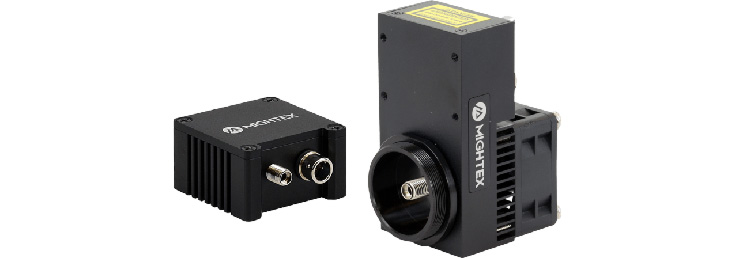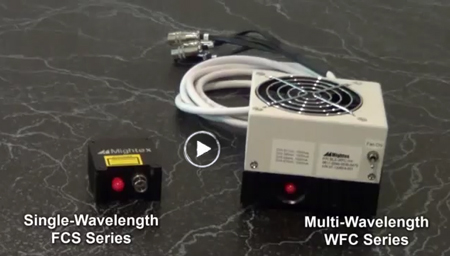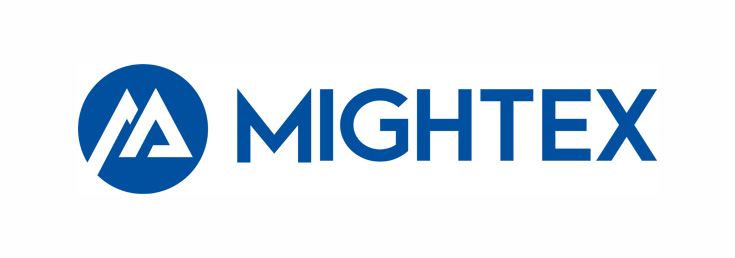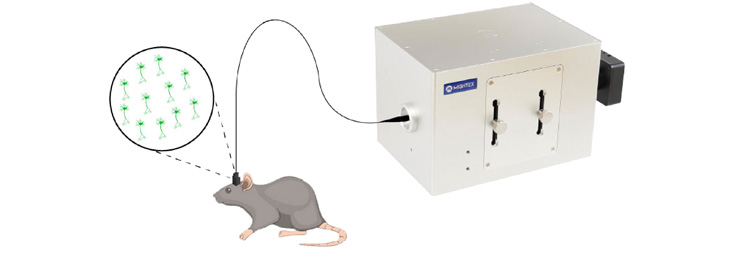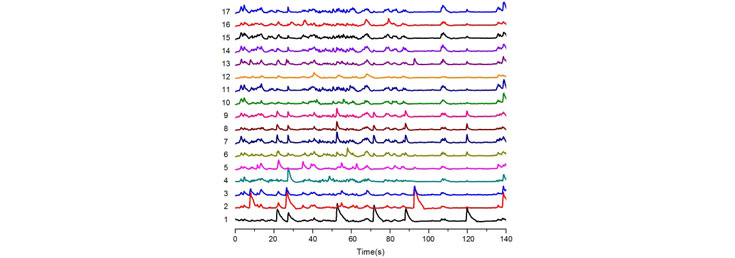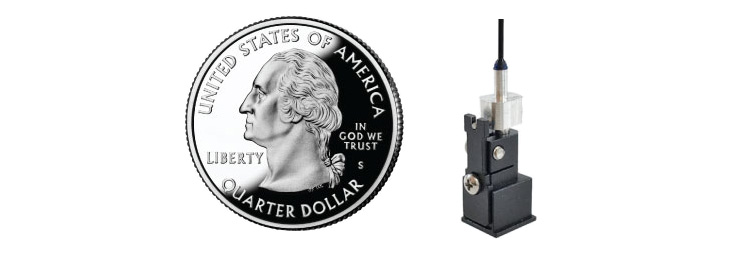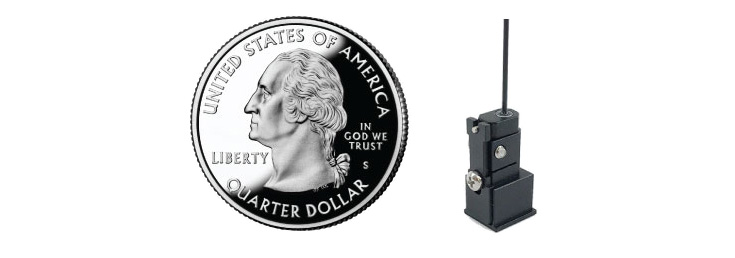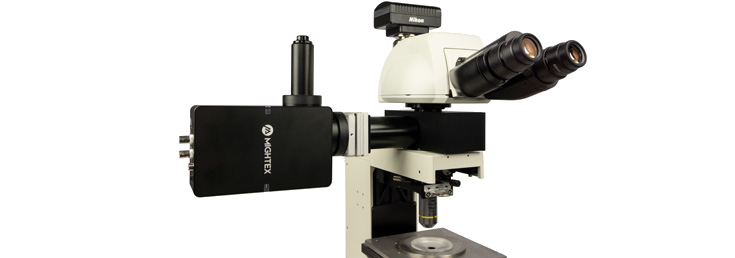Mightex High Power Fiber-Coupled LED Light Sources
Fiber-coupled LED light sources. Standard SMA fiber adapter port (SMA fiber patch cords are sold separately). Deep UV (255 nm) to NIR (980 nm). Locking electrical connector for secured connection.
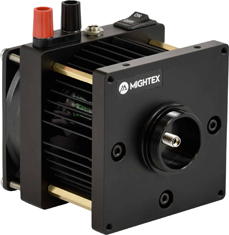
Mightex FCS-series fiber-coupled LED light sources employ the latest high-power LED technologies and a proprietary coupling optics to achieve maximum optical output power. Optical output is coupled into a fiber through a standard SMA fiber adaptor port (SMA fiber patch cords are sold separately). FCS series also features a locking electrical connector for secured connection. FCS series are designed as a universal light source for general lab use and OEM applications. The one-piece machined housing features multiple mounting holes. All Mightex LED drivers such as the SLC series or other LED drivers and current sources can be used to drive the light sources.
To drive a FCS LED source, one can use any one of the wide range of LED controllers Mightex has to offer:
IMPORTANT: For deep UV LED sources with an operating current rating of < 50 mA, it is strongly recommended that the following LED controllers be used to drive the LEDs:
- Software controlled LED controllers, Model# SLC-FA04-US; or
- Manual LED driver, Model# SLA-0100-2.
Mightex Fiber Coupled LEDs Video Guide
IMPORTANT : (1) LED’s can ONLY be driven by a constant-current source, and NOT a voltage source (e.g. a battery, or a AC/DC power supply etc.); (2) Please always verify LED’s current rating first before applying current to the LED, and please always make sure NOT to apply current that is above the LED’s current rating.
Features:
- High-power UV/VIS/NIR/white fiber-coupled LED’s
- Interchangeable fiber with SMA connector
- No moving parts in optical path
- Multiple mounting features for lab and OEM applications
- Optional LED controllers
- Compact, machined metal housing with integrated heat sink
- Locking electrical connector
Applications:
- Microscopy
- Fluorescence
- Sensors
- Semiconductor equipment
- Testing instruments
- Medical instruments
- Machine vision
Specifications
Click here to download datasheet (form manufacturer's website.)
High Power Fiber-Coupled LED Light Sources
Mightex FCS-series fiber-coupled LED light sources employ the latest high-power LED technologies and a proprietary coupling optics to achieve maximum optical output power. Optical output is coupled into a fiber through a standard SMA fiber adaptor port (SMA fiber patch cords are sold separately). FCS series also features a locking electrical connector for secured connection. FCS series are designed as a universal light source for general lab use and OEM applications. The one-piece machined housing features multiple mounting holes. All Mightex LED drivers such as the SLC series or other LED drivers and current sources can be used to drive the light sources.
Selecting a Microscopy LED Light Source
1. Select LED Wavelength
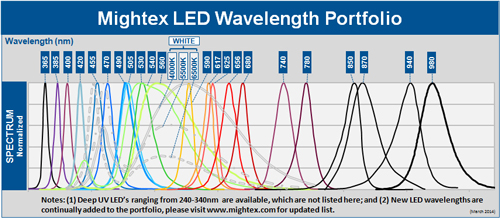
2. Select LED Configuration
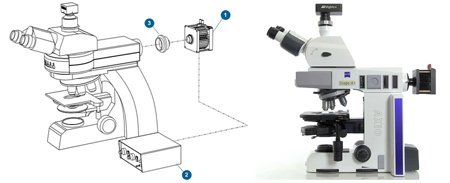
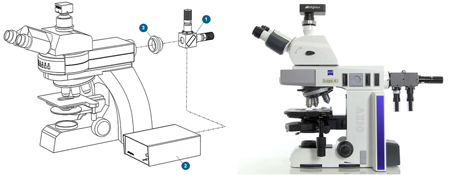
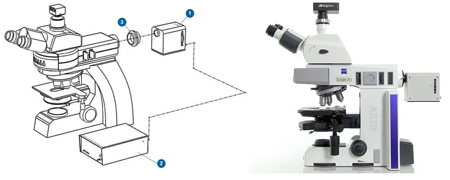
3. Select LED Controller
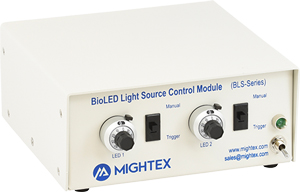
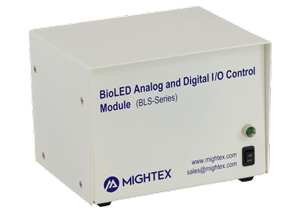
4. Microscope Coupling
Microscope adapters are available for all major manufacturers (Nikon, Olympus, Leica, Zeiss). If you have a different microscope, please contact us.

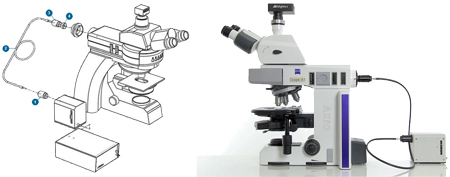
LED Application Examples
Abdelfattah AS et al., Bright and Photostable Chemigenetic Indicators for Extended In Vivo Voltage Imaging – Science (2019)
Abdelfattah et al., developed novel chemigenetic indicators for in vivo voltage imaging in neurons. To illuminate their indicators, the group used Mightex’s Microscope LEDs.
Crandall SR, et al., Infrabarrels Are Layer 6 Circuit Modules in the Barrel Cortex that Link Long-Range Inputs and Outputs – Cell Reports (2017)
In this work, Crandall et al., used Mightex’s Microscope LEDs to optically stimulating different neuronal pathways connecting to pyramidal neurons found in L6 of the whisker somatosensory cortex of mice.
Higgs MH, Measurement of Phase Resetting Curves Using Optogenetic Barrage Stimuli – Journal of Neuroscience Methods (2017)
To study phase resetting curves in vivo, Higgs and Wilson used Mightex’s Microscope LEDs to establish whether their novel method of optogenetic barrage stimulation would work during extracellular spike recordings (a recording method often used in in vivo experiments).
Also See:
Related Products:





